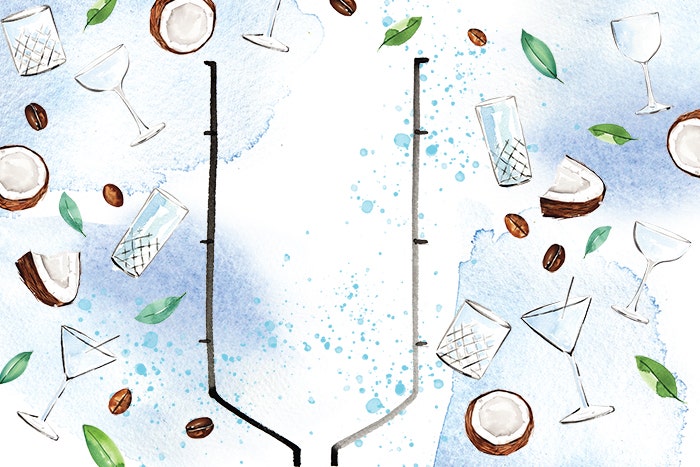When Danielle Zig, cofounder/CEO of specialty craft rum brand Coconut Cartel, partnered with a distillery to create a naturally flavored coconut rum, she tried just about everything.
“We tried fat-washing rum,” she says, infusing the spirit with coconut oil and then freezing it to skim off the fat. “We tried putting coconut flakes into the still, [but] that didn’t work to give us the profile we wanted.”
Eventually, she thought to try an unusual workaround: She used fresh coconut water instead of regular H2O to “proof,” or dilute, the Guatemalan rum down to 40% alcohol by volume (abv).
Most spirits are distilled to exceedingly high alcohol levels that would be difficult for most people to handle. To make them easier to swallow, spirits producers have long used water to cut the alcohol down to a palatable percentage. Several even flaunt the regional minerals or pH levels in the water they use to enhance terroir, like the famed limestone-rich water used to make Kentucky Bourbon.
Until recently, it was unheard of to use anything except water to proof spirits. That’s slowly changing.
In Kansas City, Missouri, J. Rieger & Co. was an early pioneer, releasing the delightfully bittersweet Caffè Amaro, proofed with cold brew coffee from a local roaster, in 2016. Three years later, FEW Spirits of Evanston, Illinois, debuted Cold Cut, a Bourbon also proofed with cold brew coffee. While it doesn’t taste like your morning espresso, it does have nuanced nutty and chocolate tones.
“Proofing, or cutting, with [something other than] water helps add additional flavor and texture to the spirit and can avoid the use of chemical additives,” says Paul Hletko, FEW’s founder/distiller.
FEW recently took another crack at the category, debuting Immortal Rye, proofed with 8 Immortals Tea, this fall. The tea adds “fruity flavors and slight astringency,” says Hletko.
For many producers, “specialty proof” spirits still fall under the realm of experimental bottlings, so some dip into alternative liquids for just limited-edition offerings. In Driggs, Idaho, for example, Grand Teton Distillery used apple juice to proof its Teton Moonshine Spiced Apple Pie Flavored Whiskey, which is no longer available.
Others view it as a long-term tool.
“For us, coconut water and rum was the right combo,” says Zig. “It gave us the mouthfeel and a light coconut note. Ultimately, it tastes different from anything else on the market, but it’s still recognizable.”
Published: October 13, 2020















